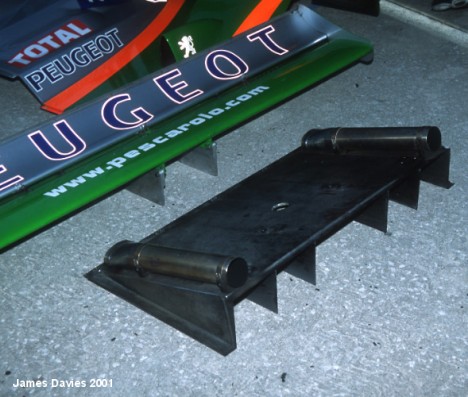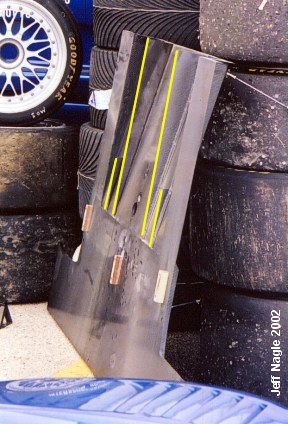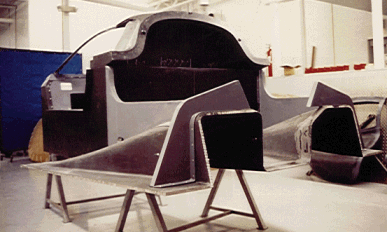
Flat bottom girls...
sgraber - 7/2/04 at 12:18 AM
You make the rockin world go round...
Erm. What I meant to ask was; I'm getting ready to create the flat bottom undertray for the engine bay and the rest of the bottom of the car. Car
will be completely flat except for a cutout where the oilpan sticks down about 2cm. There will also be vents, but that's not my question.
Specifically I'm wondering about diffuser shapes at the rear. I don't have any experience with diffusers, how long do they have to be?
What's the best shape for a rear diffuser? How far under the car should it start? How wide? I don't know anything 'bout the subject.
Can anyone provide links to someplace that will give me information? 
Thanks
Graber
GO - 7/2/04 at 12:26 AM
there's some info on the guy whos builging that funky dp1,www.dpcars.net/ (think thats the url, sorry too lazy
to find it again!)
Its in the section 9 entry, he has had some aero testing, but he's now revised the floor, his thinking is interesting but not proven yet.
The basic points as far as I remember are, starting just in front of rear axle, wide at start leading to tall and narrow, and he's now putting an
extra "wing" underneath to help the air flow into the diffuser to lower the pressure more effectively.
EDIT - found site, corrected link!
[Edited on 7/2/2004 by GO]
[Edited on 7/2/2004 by GO]
GO - 7/2/04 at 12:32 AM
just looked at that dp1 again, man thats gonna be a completely nuts car! 


ProjectLMP - 7/2/04 at 01:25 AM
This is an area I am just starting to look at on my car. Dennis from www.dpcars.net has got some interesting ideas. Time will tell how well they work
in practise. Anyway, here's what I know at the moment:
1) The diffuser should start wide and narrow down with a smooth curve. Apparently having the maximum width possible isn't always benefitial. I
read that some of the American LeMans cars ran better with narrower diffusers.
2) The angle of the diffuser influences how much downforce is produced. The steeper, the more downforce. However, you shouldn't go much above
12-14 degrees
3) The major downforce is generated around the transition point from the flat bottom to the upward sweeping diffuser. Ideally you would want this
inside the wheelbase to reduce pitch sensitivity but not infront of the C of G as this can cause instability. A lot of cars have it just at the rear
axle line which isn't ideal but still works.
4) The top corners of the diffuser should ideally have a radius. Still trying to find out how big a radius.
5) Ideally, the bottom edges of the diffuser should have a sharp edge and a small flat section. i.e _|
6) Don't make it too flimsy, I have read of diffusers collapsing.
7) Having a rear wing low to the ground and hanging out the back of the car can increase downforce by "driving" the diffuser. This is caused
by the low pressure area under the wing. Takes very careful placement of the wing to work. F1 cars use this principle.
8) Don't expect mega amounts of downforce from a diffuser.
I am also looking into front splitter designs that incorporate diffuser sections.
[Edited on 7/2/04 by ProjectLMP]
rontyler - 7/2/04 at 04:58 AM
Steve,
Aero is not my strong point but, from what I do know, LMP is on target.
Cheers.
kb58 - 7/2/04 at 05:09 AM
Buy this book:
http://www.amazon.com/exec/obidos/tg/detail/-/0837601428/qid=1076130554/sr=1-1/ref=sr_1_1/103-1826820-2443054?v=glance&s=books
Spyderman - 9/2/04 at 02:45 PM
quote:
Originally posted by kb58
Buy this book:
http://www.amazon.com/exec/obidos/tg/detail/-/0837601428/qid=1076130554/sr=1-1/ref=sr_1_1/103-1826820-2443054?v=glance&s=books
I was going to suggest the same book!
(quote Project LMP "8) Don't expect mega amounts of downforce from a diffuser."
I wouldn't expect any downforce from the diffuser! Car is not big enough!
However what you can get is a great reduction in lift, which is better! ( this might seem contradictory, but what you are doing first is reducing lift
before you can create downforce.)
Ideally you should have some skirts on either side of the floorpan. These only need to be about an inch or so deep (down to the ground is ideal), but
what they do is to keep the air passing under the car where it is neded.
The ideal is to trap all, then channel the air passing underneath the car and reduce the pressure by the use of an aerofoil type section. A rear
diffuser by itself will not give much benefit unless it is used with the rest of the bodywork, especially front spoiler.
It is necessary to try and stop air from entering the underfloor area from the sides. This can be done with a concave section at the bottom of the
body sides.
Sorry if this seems like rambling, but I know what I mean!
There are lots of pictures available on the web that you can get the general idea from. The site suggested by Go is a good example, but I would
suggest you try and keep it as simple as possible as that seems very convoluted.
Any gradual upward curve that channels the air should benefit.
Terry


[Edited on 9/2/04 by Spyderman]
ProjectLMP - 9/2/04 at 05:57 PM
Not to be pedantic  but a diffuser will generate down force. As you correctly state it won't be enough to counteract the lift from the rest of
the body i.e. negative lift coeffcient. What you are talking about with regards to aero foils is more likened to tunnels (like on GTP sports cars,
Toyota Atlantic and CART open wheel cars) which is a slightly different type of devise then a diffuser and will generate lots more downforce.
but a diffuser will generate down force. As you correctly state it won't be enough to counteract the lift from the rest of
the body i.e. negative lift coeffcient. What you are talking about with regards to aero foils is more likened to tunnels (like on GTP sports cars,
Toyota Atlantic and CART open wheel cars) which is a slightly different type of devise then a diffuser and will generate lots more downforce.
If you look at a car like an Audi R8 its diffuser looks something like

Here are some other diffusers:
Courage C60

Lola MG

This is a tunnel configuation from a Mazda GTP car:

kb58 - 9/2/04 at 06:11 PM
FWIW, mine is flat, tipped up at 17deg. The shot here is the framework without paneling yet.
http://members.cox.net/kimini2004/diffuser4.JPG
sgraber - 9/2/04 at 06:12 PM
Thanks for the photos and the discussion guys. This has helped a lot. I started my undertray this weekend and what I am finding out is that the way I
designed the rear of the car and the current exhaust position gives me very little (nothing) in the way of creating an upward slope until 12"
past the rear axle centerline.
Now my question is, if I channel the air under the car and prevent it from spilling out by adding a 1" lip on either side, will this be of any
benefit without the diffuser? Or should I call the exercise a bust and not worry 'bout it till the next time I redesign the rear of the car?
ProjectLMP - 10/2/04 at 03:14 PM
Steve,
Take a look at this Westfield XTR4 (uses Audi 1.8T engine and gearbox). Their diffuser starts pretty far back. At the very least it will look
cool!

One key point to making this work is having a nice clean underside to the car with no holes or bits hanging down. If the engine bay is exposed then
you can kiss goodbye to any serious downforce from the diffuser.
ned - 10/2/04 at 03:38 PM
that same old pic again i know, but this also shows a difuser as on our race car. it starts at the end of the blue side panel (on the floor obviously)
I'd like to see my friend tilt the exhaust up so there isn't the turbuence created by the cutout for the exhaust, though he doesn't
seem keen. the new bodywork sholud be ready soon!

Ned.
Spyderman - 10/2/04 at 06:01 PM
quote:
Originally posted by ProjectLMP
Not to be pedantic  but a diffuser will generate down force. As you correctly state it won't be enough to counteract the lift from the rest of
the body i.e. negative lift coeffcient. What you are talking about with regards to aero foils is more likened to tunnels (like on GTP sports cars,
Toyota Atlantic and CART open wheel cars) which is a slightly different type of devise then a diffuser and will generate lots more downforce.
but a diffuser will generate down force. As you correctly state it won't be enough to counteract the lift from the rest of
the body i.e. negative lift coeffcient. What you are talking about with regards to aero foils is more likened to tunnels (like on GTP sports cars,
Toyota Atlantic and CART open wheel cars) which is a slightly different type of devise then a diffuser and will generate lots more downforce.
I think we are both talking the same thing, but the difference is how we perceive the results.
Yes downforce is being created, but is not increasing the cars traction until it has counteracted the lift. Therefore by my logic it is not creating
downforce, just cancelling some of the lift.
Therefore by my logic it is not creating
downforce, just cancelling some of the lift.
The reference to aerofoils was just to liken the whole of the floorpan with an aerofoil section. With aircraft the airflow over the top of the wing is
the most important as it is here that the pressure differential is created. Lower pressure due to longer/faster airflow creating the lift. With a car
the greatest benefits are with a smoother floorpan, this is also shaped like an aerofoil, but upside down. Therefore the rear of the floorpan must
raise upward to reduce the pressure. The reason for doing it only from the rear axle is purely for practical reasons.
Wait till I start talking about wings and everyone will be confued 
I know what you mean about the tunnels, but I was not thinking of those. It was more like the first ground effect cars that were in my mind with the
flat floor and skirts. 
Terry


sgraber - 10/2/04 at 06:31 PM
I'm obviously not building a car to the standards of the examples shown (carbon fiber, yada yada) but I certainly can see the benefit in adapting
some of those strategies in a roadgoing car. Here is a pic of the underside of my car. The ali is too long out the back and will be trimmed to install
a short diffuser.

And another from the top.

You can see that the exhaust/rear chassis area are not optimal for a diffuser of great length. It is something that will be addressed in MKII.
Graber
Spyderman - 11/2/04 at 12:55 PM
Steve,
Rotating the first silencer through 90 degrees so that the flange is horizontal will improve clearance.
What do you plan to do at the front of the car?
Fitting a diffuser will help at the rear, but most cars, especially rear engined, suffer from lift at the front. This is far more noticable and
dangerous (steering going light at speed, understeer at speed).
The reason I ask is that just doing improvements to the rear is not going to make the car any easier/faster to drive. Front and rear have to be
improved together as the modifications to the front will effect how the rear works.
If for example you plan on using a front air dam it will decrease the effect of the rear diffuser. If you go the front splitter route then you need to
control the airflow under the car to get best effect.
You have probably already considered this, but I just like to point out that one aerodynamic aid on a car can have disasterous effects on the opposite
end.
It amuses me no end to see the Boy Racers and Rice Rocket brigade fit a dirty great big wing on the rear of their front wheel drive and wonder why
they can't go any faster round the corners or on the straight.
Terry


sgraber - 11/2/04 at 03:03 PM
Ah yes o'wise Spyder-Terry!
There are plans for the front of the car. An airdam is in planning as well as a method for venting the wheelwells and the radiator upwards. Of course
it's all hush-hush... only because I haven't drawn it up yet! hehehe
Those riceboys sure do make me laugh. I saw an exhaust tip the size of a large coffee can the other day, but in the very middle you could still see
the 1.25" stock exhaust... duhhhh. And those wings... OMG!  Some of them appear to have been lifted off the set of a StarTrek Klingon reunion
tour!
Some of them appear to have been lifted off the set of a StarTrek Klingon reunion
tour!
There will be none of that fluff on la Bala, I can assure you!  (Well, maybe the coffee can tips, but two of them)
(Well, maybe the coffee can tips, but two of them)
Graber
rontyler - 11/2/04 at 03:56 PM
Guys, guys... We really should't thumb our noses up at the Rice Boy's... They are WAY fast... haven't you seen the "Fast and the
Furious"? We can only DREAM of having 10 second cars that pull 1G on the "pad"... Those guy's know how to git it dun!
LOL 

kb58 - 11/2/04 at 05:34 PM
I always wanted to ask said Ricer what the Cf and Cd (lift and drag coefficients) are of his wing... I'm sure he knows...
Back to underchassis issues, I have no idea whether my diffuser will work, but I figure it can't hurt. Reading books and taking an educated
guess is about the best most of us can do. *Especially* those of us without a windtunnel or having built previous cars...
[Edited on 11/2/04 by kb58]












 Some of them appear to have been lifted off the set of a StarTrek Klingon reunion
tour!
Some of them appear to have been lifted off the set of a StarTrek Klingon reunion
tour!  (Well, maybe the coffee can tips, but two of them)
(Well, maybe the coffee can tips, but two of them)